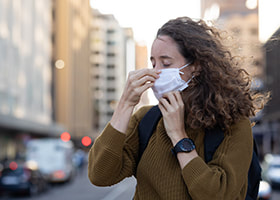|
By Sybil Cummin, MA, LPC, ACS  To wear a mask or not to wear a mask. This is the question. For many areas of the world right now, masks are required to enter businesses or to return to work. On the one occasion that I forgot my mask in my car, I felt the judgment and evil eyes searing into me. And I get it. We are facing something that we have never seen in my lifetime. A real threat to our health and the health of our loved ones. No matter what you believe, that masks are stupid and not helping anyone, that we have lost many of our freedoms, that this pandemic is a hoax, masks are going to be a fashion accessory for some time. But what if wearing a mask is not just an inconvenience or a bit uncomfortable for you? What if the feeling of your hot breath and lack of oxygen intake causes extreme fear? Well, if you have been smothered or choked by an abusive partner, then the feeling of a mask covering your face preventing you from breathing naturally can be the trigger of a flashback or anxiety attack. This trauma response is unfortunately common. Strangulation and other forms of asphyxiation are used often as a way to control an intimate partner when physical violence is used in the relationship. It is important to note that strangulation is, in fact, one of the best predictors for the subsequent homicide of victims of domestic violence. One study showed that “the odds of becoming an attempted homicide increased by about seven-fold for women who had been strangled by their partner” (Journal of Emergency Medicine, 2008). And these survivors are reexperiencing some of the same feelings just to go to the grocery store or to go back to work. The threat and fear are even higher when they are still living with their abuser. They might be mocked or hurt just due to their reaction to the mask. This response, seen as a weakness by their partner, provides ample opportunities to increase isolation, fear and gaslighting in these relationships.
Some of the other negative effects of this response is a possible increase in isolation and fear to leave the home. When others in their ecology question why they do not leave the home or question about wearing a mask, what do they tell them? If the person questioning does not know their experience or does not know the extent of the abuse, a survivor may be unlikely to share. An increase in shame and embarrassment about the situation is the consequence, which likely leads to more and more isolation. The trauma response to wearing a mask may interfere with a survivor’s financial situation. What if they need to be able to wear a mask all day to return to work? The answer to helping these victims and survivors is not completely clear, and everyone will be on their own timeline. Different forms of therapy will come at this in many different ways and many individuals will not seek therapy at all. I write this to inform our mental health community on something that had not even crossed my mind until it was shared by several of my clients. Having the awareness that this may be a barrier to your client’s healing and daily functioning can give us a leg up in continuing to provide a non-judgmental space for our clients. One where they do not fear the questioning they already receive from everyone else.
0 Comments
Leave a Reply. |
AuthorSybil Cummin, MA, LPC, ACS Archives
February 2021
Categories
All
|
